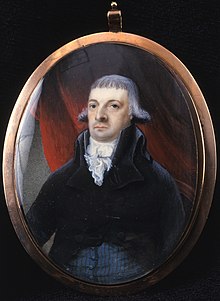John Brown (politician, 1736)
John Brown (born January 27, 1736 in Providence , Colony of Rhode Island and Providence Plantations , † September 20, 1803 ibid) was an American politician . Between 1799 and 1801 he represented the state of Rhode Island in the US House of Representatives .
Career
John Brown was a member of a prominent family in Rhode Island. He was a descendant of Chad Brown, a co-founder of the city of Providence, Rhode Island. His nephew Benjamin represented the State of Massachusetts as a member of Congress between 1815 and 1816 . Brown's grandson, John Brown Francis, was governor and later US senator for Rhode Island. His younger brother Moses later joined the abolitionist movement for the abolition of slavery , having initially also worked in the slave trade.
Brown grew up in the British colonial days. Together with his brothers Nicholas, Joseph and Moses, he ran a successful farm and worked in the mail order business. John Brown was also actively involved in the slave trade and in the China business. He and his brothers were instrumental in founding what would later become Brown University . From 1774 until his death, John Brown was the curator of this facility. From 1775 to 1796 he was also treasurer of this university. On June 17, 1772 he was involved in the destruction of the British ship Gaspée . This event later contributed to the outbreak of the War of Independence . Following the incident, he was arrested and taken to Boston to be tried. Thanks to the efforts of his brother Moses, he was released again.
From 1782 to 1784 John Brown was an MP in the Rhode Island House of Representatives . In 1784 he was elected to the Continental Congress, but without taking up his mandate there. Brown became a member of the Federalist Party . In the 1798 congressional elections, which were held nationwide, he was elected to the US House of Representatives in Washington . There he replaced Thomas Tillinghast of the Democratic-Republican Party on March 4, 1799 . Until March 3, 1801 Brown could only complete one term in Congress, then the re-elected Tillinghast won back his previous seat. After leaving Congress, Brown resumed his old activities. He died in September 1803 in his native Providence.
Web links
- John Brown in the Biographical Directory of the United States Congress (English)
- John Brown in the database of Find a Grave (English)
| personal data | |
|---|---|
| SURNAME | Brown, John |
| BRIEF DESCRIPTION | American politician |
| DATE OF BIRTH | January 27, 1736 |
| PLACE OF BIRTH | Providence , Rhode Island |
| DATE OF DEATH | September 20, 1803 |
| Place of death | Providence , Rhode Island |

